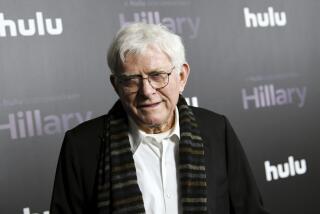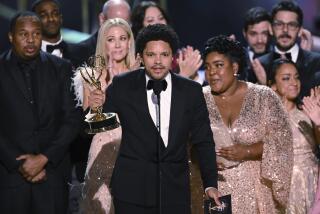Did Donahue’s Genre Become His Nemesis?
- Share via
NEW YORK — Phil Donahue may have been the victim of his own success.
Donahue, 60, who announced Tuesday that he will end his 28-year-old weekday series at the end of this season, virtually created the genre of topical talk shows and was its most popular practitioner for many years. But in the increasingly crowded, sensationalized field that has evolved, some observers said, his more serious side made him seem like a PBS intellectual by comparison.
“Phil prides himself on being a journalist--he just had [author] Salman Rushdie on this week,” said Dick Coveny, executive vice president of Multimedia Entertainment, which syndicates Donahue’s show as well as Jerry Springer’s and Sally Jessy Raphael’s. “Some other shows today are pushing the envelope in terms of titillation.”
At the same time, Coveny maintained, the audience has changed. “Daytime-TV viewers want to be more entertained than informed. When we did shows on child abuse on Jerry Springer, nobody watched. Oprah’s still on top, but her ratings have dropped since she started emphasizing serious topics.”
Coveny and other Multimedia executives emphasized that it was Donahue’s call to end the show. But industry observers noted that his ratings had been declining and said the handwriting had been on the wall since WNBC, the NBC-owned station in New York City, decided last August not to renew “Donahue” for this season. KNBC-TV Channel 4 in Los Angeles had announced plans to drop the show in June.
“Once they lost New York, that sent a message to advertisers and other stations that the show was fading,” said Bill Croasdale, who is in charge of buying TV time for Western Media International.
“Donahue” had ranked third among daytime talk shows as recently as two seasons ago. It is 13th this season. The program was particularly hurt by the infusion of shows with younger hosts. “Ricki Lake delivers a concentration of the young demographics that advertisers want,” Croasdale said.
Donahue, who launched his show in Dayton, Ohio, in 1967, declined to be interviewed. But other talk-show hosts paid tribute to the nine-time Emmy winner.
Oprah Winfrey, who displaced him during the 1986-87 season as daytime’s No. 1 draw, said that she was “very, very sorry” to hear about Donahue’s decision.
“I have said from the very first day of my show, if there hadn’t been a Phil, there wouldn’t have been a me,” she said.
A spokeswoman for Winfrey said that she would continue to take the more serious tack her show has been on over the last year.
Maury Povich also praised Donahue, whose interviews with the 1992 presidential candidates helped put “new media” on the old-media map. “Without ever being in straight news, Phil was a citizen-reporter,” he said.
Povich, whose talk show was just renewed for two more years, disagreed with the theory that more sensationalized shows hurt Donahue.
“I think any drop in his ratings was more a function of the sheer number of shows today,” Povich said.
More to Read
The complete guide to home viewing
Get Screen Gab for everything about the TV shows and streaming movies everyone’s talking about.
You may occasionally receive promotional content from the Los Angeles Times.






